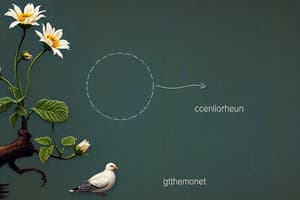Podcast
Questions and Answers
Which process is primarily responsible for converting light energy into chemical energy in plants?
Which process is primarily responsible for converting light energy into chemical energy in plants?
- Protein Synthesis
- Photosynthesis (correct)
- Cellular Respiration
- Mitosis
What is the primary outcome of mitosis?
What is the primary outcome of mitosis?
- Formation of a new species
- Release of energy from organic molecules
- Creation of genetically identical daughter cells (correct)
- Production of gametes
What is the process called that results in the formation of new and distinct species?
What is the process called that results in the formation of new and distinct species?
- Genetic drift
- Speciation (correct)
- Natural selection
- Mutation
Which biological systems work together to maintain homeostasis in organisms?
Which biological systems work together to maintain homeostasis in organisms?
What term describes the shared evolutionary past between organisms?
What term describes the shared evolutionary past between organisms?
Which characteristic of life refers to the ability to extract and utilize energy?
Which characteristic of life refers to the ability to extract and utilize energy?
What does the cell theory state about living cells?
What does the cell theory state about living cells?
In the hierarchy of biological organization, which level comes directly after cells?
In the hierarchy of biological organization, which level comes directly after cells?
Which branch of biology focuses on the interactions between organisms and their environment?
Which branch of biology focuses on the interactions between organisms and their environment?
Which of the following best describes 'adaptation' in living organisms?
Which of the following best describes 'adaptation' in living organisms?
Flashcards
Biology Definition
Biology Definition
Biology is the scientific study of living organisms and life.
Cell Theory
Cell Theory
All living things are made of cells, and new cells come from existing cells.
Organization of Life
Organization of Life
Living things are organized from atoms to cells, tissues, organs, and ultimately to whole organisms.
Metabolism
Metabolism
Signup and view all the flashcards
Ecology
Ecology
Signup and view all the flashcards
Photosynthesis
Photosynthesis
Signup and view all the flashcards
Cellular Respiration
Cellular Respiration
Signup and view all the flashcards
Evolution
Evolution
Signup and view all the flashcards
Natural Selection
Natural Selection
Signup and view all the flashcards
Organisms
Organisms
Signup and view all the flashcards
Study Notes
Introduction to Biology
- Biology is the scientific study of life and living organisms, encompassing their structure, function, growth, origin, evolution, distribution, and taxonomy.
- It encompasses a wide range of disciplines, including botany, zoology, microbiology, genetics, and ecology.
- Biological inquiry employs scientific methodology, observation, experimentation, and data analysis to understand biological phenomena.
Fundamental Characteristics of Life
- Organization: Living organisms exhibit a hierarchical structure, from atoms to molecules, to organelles, cells, tissues, organs, organ systems, and finally to the organism itself.
- Metabolism: Living organisms carry out chemical reactions enabling them to extract energy from their environment, and to utilize it for growth, reproduction, and other life processes.
- Growth and Development: Living organisms increase in size and complexity through cell division and differentiation.
- Adaptation: Over time, organisms evolve and adapt to their environment through natural selection.
- Response to Stimuli: Organisms detect and react to changes in their surrounding environment.
- Reproduction: Living organisms produce offspring, enabling the transmission of genetic information to future generations.
Cell Theory
- All known living things are made up of one or more cells.
- All living cells arise from pre-existing cells by division.
- The cell is the fundamental unit of structure and function in all living organisms.
Levels of Biological Organization
- Atoms and molecules form the building blocks of life.
- Molecules combine to create organelles within cells.
- Cells form tissues, which combine to form organs, and organs work together in organ systems.
- Multiple organ systems make up the organism.
- Multiple organisms in an area make up a population, and multiple populations form a community.
- An ecosystem encompasses the living and non-living parts of an environment.
- The entire Earth constitutes the biosphere.
Important Branches of Biology
- Botany: The study of plants
- Zoology: The study of animals
- Microbiology: The study of microorganisms
- Genetics: The study of genes and heredity
- Ecology: The study of the interactions between organisms and their environment
Diversity of Life
- Living organisms exhibit a vast array of forms and functions.
- Classification systems, like the Linnaean system, categorize organisms based on shared characteristics.
- Three domains of life include Bacteria, Archaea, and Eukarya (which includes Protists, Fungi, Plants, and Animals).
Key Biological Processes
- Photosynthesis: The process by which plants and some other organisms convert light energy into chemical energy.
- Cellular Respiration: The process by which cells release energy from organic molecules.
- Meiosis: A type of cell division that produces gametes (sex cells).
- Mitosis: The process of cell division that produces two genetically identical daughter cells.
- DNA Replication: The process of making a copy of DNA.
- Protein Synthesis: The process of making proteins from amino acids.
Evolution
- Evolution is the change in the heritable characteristics of biological populations over successive generations.
- Natural selection is the differential survival and reproduction of individuals due to differences in their traits.
- Common ancestry describes the shared evolutionary past between organisms.
- Speciation is the process that results in the formation of new and distinct species.
Biological Systems
- Organisms are comprised of interconnected biological systems working together to maintain homeostasis.
- Examples of these interconnected systems include the cardiovascular, respiratory, nervous, digestive, endocrine, and immune systems in animals.
Importance of Biology
- Understanding biological processes helps in developing medical treatments and advancements.
- Studying the environment and ecosystem dynamics allows us to understand and address sustainability concerns.
- The study helps us understand our place in the universe and our relationship to other living organisms.
- Applied biological knowledge is crucial in agriculture, food production, and biotechnology.
Studying That Suits You
Use AI to generate personalized quizzes and flashcards to suit your learning preferences.




